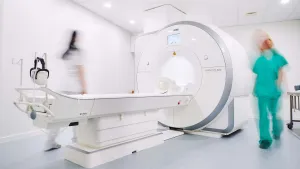
Prostate diagnostics with MRI - gentle, precise and reliable.
Prostate imaging may help to identify three major health problems of the prostate gland: cancer, benign enlargement of the prostate, and inflammation (bacterial or abacterial). Imaging plays an important role in diagnosing and separating these problems.
Prostate carcinoma is the third most common tumor in men. If an elevated prostate-specific antigen (PSA) level has been found in blood testing or if your urologist has made a conspicuous palpatory finding. PSA is usually raised when you have prostate cancer, but it can also be raised for other reasons; for example, if you have an infection of the prostate gland (prostatitis).
Your doctor might request an MRI of the prostate gland for a number of reasons:
- To show if there is evidence of cancer in the prostate gland if you have a high or rising PSA level. This enables the urologist to perform a targeted biopsy (usually in addition to a random biopsy of the prostate).
- To show the extent of prostate cancer (specifically, to assess whether it is contained within the prostate capsule or if a tumor has spread outside the gland in surrounding tissues).
- To help in planning surgical or radiotherapy treatment for prostate cancer.
- To find prostate cancer that has relapsed after treatment.
Multi-parametric MRI is generally requested because it provides more detailed images of the prostate gland and surrounding structures than other radiological tests, like the ultrasound.
We perform state-of the art multiparametric prostate MRI (mpMRI) according to current guidelines. This guarantees maximum diagnostic yield of the examination. Your treating urologist receives a standardized report according to PI-RADS evaluation criteria. This is a recognized standardized diagnostic scheme that describes the most aggressive tumor sites, so that your urologist can perform a targeted biopsy and often save you repeated tissue harvesting.
If you already have a confirmed low-grade prostate carcinoma that is not clinically relevant (less aggressive tumor), your urologist may suggest that the tumor can be actively observed ("active surveillance") by periodic prostate MRI.
Members of our staff are experts in the field of prostate MRI and have special certification for mpMRI issued by the German Radiological Society.
For details on the completely pain-free mpMRI of the prostate, please refer to our patient leaflet.
Note: The costs of the examination are usually reimbursed by private health insurance companies.
Information for patients with statutory health insurance: As a qualified and certified partner of a special care program of statutory health insurance companies, we offer you the opportunity to take advantage of a multiparametric prostate MRI in our MVZ in case of a justified suspicion or already confirmed diagnosis of prostate carcinoma, without any additional or self-payments. You can find participating health insurance companies in the program here. If your statutory health insurance company does not participate, we can only offer you multiparametric prostate MRI as a self-pay service (IGeL).



